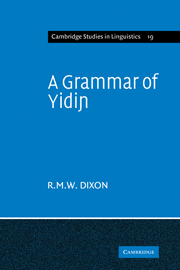Book contents
- Frontmatter
- Contents
- List of maps and plates
- Preface
- Acknowledgements
- Abbreviations
- Rough guide to pronunciation
- 1 THE LANGUAGE AND ITS SPEAKERS
- 2 PHONOLOGY
- 3 MORPHOLOGY
- 4 SYNTAX
- 5 DEEP SYNTAX
- 6 LEXICON
- APPENDIX: PREVIOUS WORK ON YIDIN
- TEXTS
- REFERENCES
- VOCABULARY
- LIST OF AFFIXES
- INDEX OF AUSTRALIAN LANGUAGES AND TRIBES
- Plate section
APPENDIX: PREVIOUS WORK ON YIDIN
Published online by Cambridge University Press: 05 February 2012
- Frontmatter
- Contents
- List of maps and plates
- Preface
- Acknowledgements
- Abbreviations
- Rough guide to pronunciation
- 1 THE LANGUAGE AND ITS SPEAKERS
- 2 PHONOLOGY
- 3 MORPHOLOGY
- 4 SYNTAX
- 5 DEEP SYNTAX
- 6 LEXICON
- APPENDIX: PREVIOUS WORK ON YIDIN
- TEXTS
- REFERENCES
- VOCABULARY
- LIST OF AFFIXES
- INDEX OF AUSTRALIAN LANGUAGES AND TRIBES
- Plate section
Summary
Although there has been close white settlement in the Yidiɲ language area for a hundred years, almost no attempt has been made to record the language. The City of Cairns (with a population of around 30,000) has its Historical and Naturalists' Societies, but these bodies have never initiated any project to study the Aboriginal language or culture.
A few scraps of language were recorded, almost exclusively by visitors to the region. These are listed below under the three main dialects – Guŋgay, Waɲur(u) and Yidiɲ (see 1.2). Nothing at all is recorded of the Maday dialect, the last speaker of which died in the late nineteen-sixties (the writer had tried, without success, to contact her in 1964); it is not certain whether Maday was another name for Waɲur(u), or a separate linguistic/tribal unit.
[I] Guŋgay
(a) Rev. E. R. B. Gribble, missionary at Yarrabah from 1892 to 1909, published a number of short vocabularies and anthropological scraps. Chiefly:
(1) ‘By Rev. Mr Gribble, Yarrabah Station, Tribal Dialect of Goon-gan-je’, Australasian Anthropological Journal, vol. 1, no. 1, p. 13 (1896). About 45 forms–nouns, pronouns and some phrases.
(2) ‘C. Grafton dialect of Goonganji tribe, by Rev. E. R. B. G. of Bellendenker Mission’, Australasian Anthropological Journal, vol. 1, no. 3, pp. 16–17 (1897). About 100 items in a comparative table of vocabularies from a number of languages. (This whole table was reprinted almost in toto in Science of Man, vol. 12, pp. 211, 231, 251 (1912).)
[…]
- Type
- Chapter
- Information
- A Grammar of Yidin , pp. 508 - 512Publisher: Cambridge University PressPrint publication year: 1977



